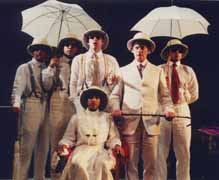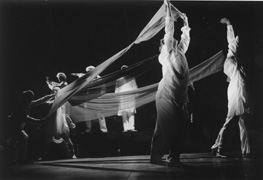
Randy Gener
All the Raj: Forster's Passage to the Stage from the Inside Out
 |
| Photo by John Haynes |
E.M. Forster's A Passage
to India
Shared Experience
Adapted by Martin Sherman
Directed by Nancy Meckler
Designed by Niki Turner
BAM Harvey Theater (651 Fulton Street in Brooklyn)
Nov. 2 through 6 at 7:30 PM
Tickets: $25, 40, 60. Call (718) 636-4100 or visit www.bam.org
A little over a year ago, two stage adaptations of novels about India were simultaneously running in London. One of them, the Royal Shakespeare Company's almost four-hour version of "Midnight's Children," which was co-authored by Salman Rushdie himself, came with heavy-duty credentials and a huge cast of Indian actors. The other one, Shared Experience's dramatization of E.M. Forster's "A Passage to India," directed by Nancy Meckler and adapted by Martin Sherman, was the work of a smaller enterprise, with an 11-member cast, some of whom shift playing Anglo-Indian and Indian characters.
Although both were notable and worthy efforts, the difference between the two Brit stagings proved to be greatly revealing. Even before the RSC production went into rehearsal, it had bagged an immediate U.S. booking. By contrast, Shared Experience is only now premiering its production of "A Passage to India," beginning performances Nov. 2 at the Brooklyn Academy of Music.
In Britain, RSC is the Goliath that could immediately strong-arm its epic productions into international tours, sight unseen. But as a passage into Indian history, RSC's big-budget extravaganza collapsed under the weight of its songs, dances, dizzying scene shifts and expensive documentary-film apparatus.
A Shared Experience show, however, is something else altogether. It is movement-based storytelling executed with economy, actorly flair and bare-bones invention. London critics, in fact, hailed the company for keeping track of a complex narrative involving the racial, class and cultural tensions of India under the British colonial rule through a simplicity of means. "This cast may be small but its reach is long," notes a typical review by Susannah Clap in The Observer. "The staging is admirably uncluttered," avers Paul Taylor of The Independent.
 |
| Photo by John Haynes |
Perhaps because so much of Indian history has yet to reach full understanding in the West, so many India-set productions either resort to Bollywood references or get bogged down in documentary realism. And because of the Oriental exoticisms promulgated by gorgeous travesties like the 1984 David Lean movie "A Passage to India," in which Alex Guiness had to brown up to play the part of a Hindu professor, cinematic tropes are almost always applied when dramatizing literary fiction for the stage. As it turns out, one need not go so far. As Shared Experience's production shows, it is a mistake to go after multimedia splendor and to not trust the delicate glory of actors interpreting a text. More importantly, a truer re-thinking of Forster's novel, which was written in 1924, is best done if the story is seen through Indian eyes rather than colonial ones.
"One of the things I was very keen on was to heighten the experience," says Nancy Meckler, speaking from London about her scrupulous rendering of the Forster novel. "In my production, there are two Indian musicians onstage. They are right on the scenery, and they play throughout the piece. Because at Shared Experience we work so impressionistically, the production is very minimalist. The set is made of brass, but its aged, ruined brass, so it takes the light in an astonishing way. Every time you change the lighting, something happens on the brass. All the costumes are white, so there's very little color, but when certain fabrics are used, the bright spots of color look very effective. I thought that if we have color all the way through, in a funny way the show will start to become too ordinary."
The bolder stroke, in other words, is to transform the elements of theatre
in order to evoke India, or to fasten certain notions of India. "Obviously
India
is inside people's heads," Meckler continues. "What we've done is
to suggest something, rather than say we brought India on stage between the
bright
lighting, the brass, the white costumes and the music. Of course, we also
do our Shared Experience thing. For example, the Marabar Caves scenes are
very important to the Forster novel. They are one of the images that have
been discussed ad infinitum as to what they mean. Some people think the caves
mean subconscious, and so in our production we finally decided that it can
be an evocation of the subconscious of the character, Adela Quested, who enters
those caves."
Visually showing the subconscious through theatrical elements is nothing new to Shared Experience, whose last BAM engagement in 2000, a superb dramatization of Charlotte Bronte's "Jane Eyre" (directed by Meckler's coartistic director Polly Teale), also had the guts to depict "the madwoman locked up in the attic of imagination" by fusing it with Jane Eyre's younger self. "Shared Experience plays all the time with expressionistic levels of reality," Meckler says. "We're always getting at the essence of a novel."
"A Passage to India" is Shared Experience third BAM engagement. Its BAM debut, Meckler's thrilling production of "Anna Karenina" in 1998, took place mainly as a result of the early support of BAM executive producer Joseph V. Melillo. As Meckler tells it, Shared Experience almost did not make it to the 1998 BAM Next Wave Schedule without Melillo's help.
"What happened was that Harvey Lichtenstein was going to take a production of ours of 'War and Peace' at the National Theatre," Meckler recalls. "'War and Peace' was a huge production with a lot of people in it. BAM, which was initially going to bring it to New York, suddenly couldn't, because they were constricted with an agreement the Royal Shakespeare Company. It was very sad. They said, We're really sorry, but we can't take you."
It was Melillo who offered an alternative solution. He asked, "What if Shared Experience revived 'Anna Karenina,' which happens to have fewer people. "Whereas Harvey would ordinarily never ever take something he had never seen, Joe read the reviews for 'Anna Karenina' and went straight from meeting us and seeing a partial video and then actually talked Harvey into having us. It was a huge triumph. So I've always been really thrilled when BAM wants to take one of our pieces. It's been three times. I've always felt that Joe has had a lot of faith in us. He always comes to see our shows in London, whether he takes them to BAM or not. He's always ready to believe in the work. That's meant a lot to us over the years."
And Shared Experience's BAM Next Wave Festival engagement, which runs through Nov. 6, is a prestigious New York booking for the company, even though it happens more than a year later. "What happens is that people are very happy to book you if you are called the Royal Shakespeare Company even though it might be a show that doesn't exist yet," Meckler says. "For the most part we would only try to tour something internationally if the show already exists and if we are remounting. Otherwise, you might be bringing something that's actually not too bad. We really want to do a show that would have a further life. With 'A Passage to India,' we really tried very hard to get other dates, but it wasn't easy."
It would be tempting to say that, compared to the Goliaths of the British stage, Shared Experience is more akin to a biblical upstart like David. But that, of course, is to overstate the case, since the 30-year-old company is truly a Goliath when it comes to adapting literary fiction and bringing them to theatrical life. As Melillo himself declares, "There is no one better than Nancy Meckler in being able to translate the novel form into the dramatic form. This is the specific artistry of this director, creating the narrative that is linked together with movement and visuals to tell an epic story." [Gener]
Randy Gener is a founding theatre critic of The New York Theatre Wire,
and the author of the plays "Love Seats for Virginia Woolf" and
"What Remains of a Rembrandt Torn into Four Piece."

| home | discounts |
welcome |
| museums | recordings |coupons |
classified |